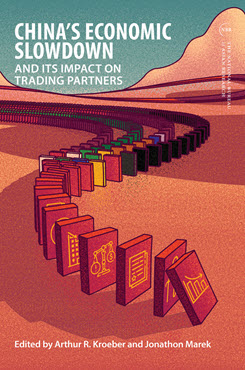Chapter in NBR Special Report 118
China’s International Economic Narratives in an Age of Slowing Growth
This chapter analyzes China’s international messaging strategy for economic engagement amid domestic economic slowdown, low consumer spending, and eroding foreign investor confidence.
EXECUTIVE SUMMARY
MAIN ARGUMENT
As China faces an economic contraction and declining foreign investor confidence, Beijing seeks to reinject positivity into its economic image through external narratives that project strength, market liberalization, and support for globalization. China’s international economic narratives are a facet of its broader set of economic challenges and subsequent engagement strategies with foreign stakeholders. Five central narratives support China’s economic objectives: (1) attracting foreign investment, (2) convincing foreign investors of China’s greater reform and liberalization, (3) advancing China’s intellectual property and market access rights, (4) countering foreign de-risking efforts, and (5) navigating foreign trade barriers and technology restrictions. Beijing’s information operators use targeted messaging techniques to encourage favorable trade positions from foreign stakeholders while dissuading unwanted policies. Such increasingly asymmetrical trade practices, however, will likely undermine Beijing’s messaging as it seeks to counter international calls for the diversification of supply chains.
POLICY IMPLICATIONS
- Despite growing trade frictions and international economists’ recommendations for China to transition to a consumer-driven economy, its policies signal that the country is unlikely to meaningfully liberalize its market in the near term as it doubles down on its export-led growth model. Nonetheless, Beijing’s official messaging to foreign investors aims to disavow criticisms surrounding trade deficits, low consumer confidence, and supply chain risks.
- China’s carefully curated narratives surrounding its asserted world-class business environment, embrace of intellectual property rights, and promotion of the rule of law work to conceal the unequal treatment of foreign firms competing in the Chinese market. Foreign stakeholders who buy into these narratives in the pursuit of profitability may ultimately provide one-sided contributions to China’s technological, talent, and supply chain ecosystems.
- Due to Beijing’s apparent unwillingness to abandon its export-led growth model, trade frictions will continue for the foreseeable future and likely induce protectionist policies globally to rebalance trade and reduce reliance on China. Beijing will find it increasingly challenging to convince foreign trade partners of the win-win nature of economic engagement as trade deficits widen.
David Gitter is a PhD student in the School of Public and International Affairs at Princeton University and the founder and principal of Erelas LLC, where he leads specialized research of Indo-Pacific affairs to inform public- and private-sector stakeholders. He is also a Nonresident Fellow at the National Bureau of Asian Research.
Note: The author is deeply grateful to Zaki Atia and John Broach, whose countless hours of Chinese-language research and insightful analytical contributions significantly informed and elevated this assessment.


